Back to the 90s
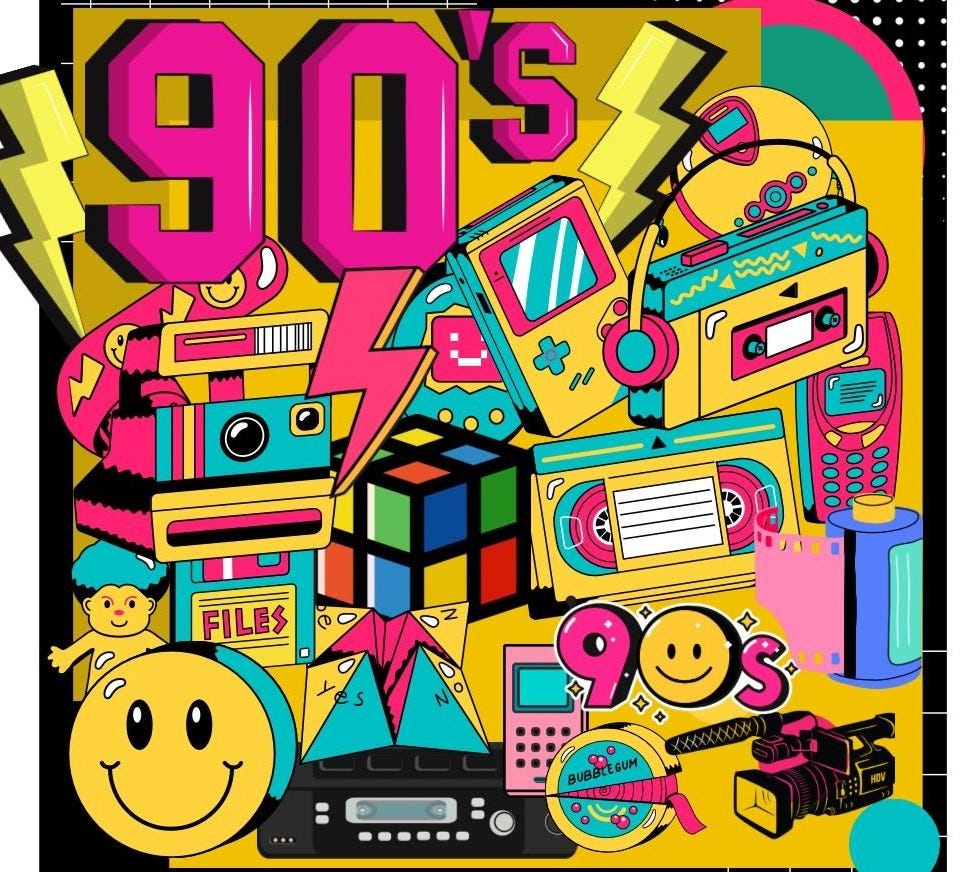
Saturday May 18th was a strange day. It was the night of the 2024 Eurovision Song Contest, that same evening Morgoth from Morgoth’s Review, Millennial Woes and Greg Johnson did a stream together on Britpop, a cultural movement that swept the nation in the mid-90s that you might have heard of. I then noticed that the YouTube algorithm recommended me Match of the 90s, a show that reviews every English football season from the decade but with a comical slant to it, alongside a popular song by the dance act Jamiroquai called Virtual Insanity. ‘That’s a lot of 90s for one evening’ I thought to myself.
This naturally led me onto the ‘back to the 90s’ meme. In truth, I had been pondering on this for some time now, it keeps coming up and I am still unsure what to make of it. It is not easy because, for starters, almost any time in recent history seems better than now: the 90s, the early noughties, even the 2010s. At the heart of the meme is a longing for the past and this is by no means unique to the online right, far from it actually. Scroll through the comments section on YouTube for many classic songs or movies from the past and you’ll understand what I mean.
The 90s was an interesting if slightly confusing time in the zeitgeist. In truth, it was a complex decade with lots of nuance and variety, certainly more than I had realised before sitting down to write this article. I think it is hard to compare one decade with another because each is the product of unique cultural, economic, political and material conditions. So, why the 90s then? Is it the aesthetic? Is it the mood and atmosphere? The cultural and social landscape? My instinctive reaction is that life was just simpler and better. Technology wasn’t overbearing, politics wasn’t everywhere, things worked and we were culturally intact.
The early 90s was a somewhat natural and expected hangover from the ’80s, a decade filled with hope and optimism. The Berlin Wall collapsed in 1989 and the Cold War had come to an end just two years later, by the time the decade had commenced the global landscape had changed so much compared with the previous decade.
In terms of politics, I have to confess that I had to search fairly hard to find anything to write about, as precious little came to mind initially. The first thing of note was the poll tax riots in March 1990, not the ideal start to the decade as an estimated 200,000 people gathered in central London to protest the new ‘community charge’, protests which soon turned violent.
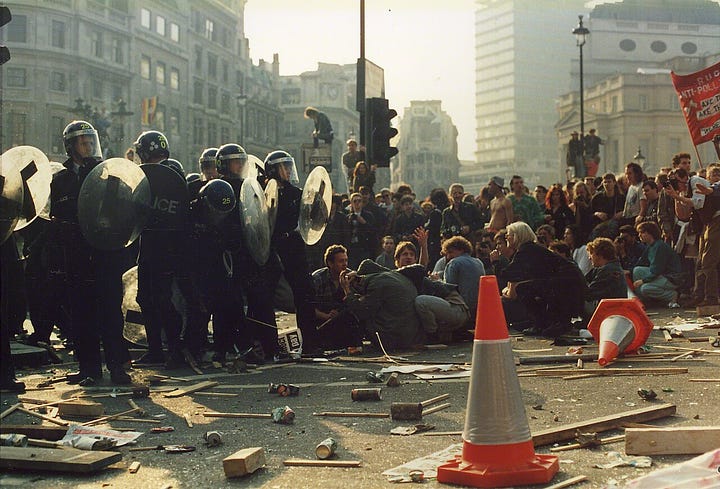
Then there was the Gulf War, America’s invasion of Iraq in which Britain was also one of the belligerents. The Bill Clinton and Monica Lewinsky saga over in the U.S. quickly came to mind but the main story I recall from the decade was, unsurprisingly, the rise of New Labour. The recessions in the early 1990s deserve a mention as does Black Wednesday and the sterling crisis. The Troubles in Ireland did continue into the 90s and there was the breakup of the former Yugoslavia which led to the Yugoslav Wars across the region, arguably the worst fighting on the continent since World War 2 that would last into the next century. The Oslo Accords in 1993 brought hope and optimism to the possibility of peace in the Middle East, though it would not last long. That is actually a fairly long list but few of these stories consumed us in much the way current events does today. Now, politics is literally everywhere and you can’t avoid it even if you try. I think age definitely plays a part as you just aren’t receptive to politics until, roughly, your mid to late-teens but the 90s was distinctly less political and less partisan, people weren’t as divided and politics simply didn’t mean as much back then. Technology is also a factor too as we just weren’t as connected in the 90s as we are now.
There were no identity politics either, certainly not on the scale we have today. If you watched Blackadder on a weekday evening, had an opinion on Blur versus Oasis and knew the lyrics to ‘Three Lions’ that was good enough, that was it. Now that might sound superficial to some but in the 90s being British didn’t need to be intellectual, it hardly even needed to be stated because we had confidence as a nation, people largely set aside their differences and stood together as one. Had you tried to play identity politics back then I am pretty sure you’d have been seen as a weirdo and an outcast.
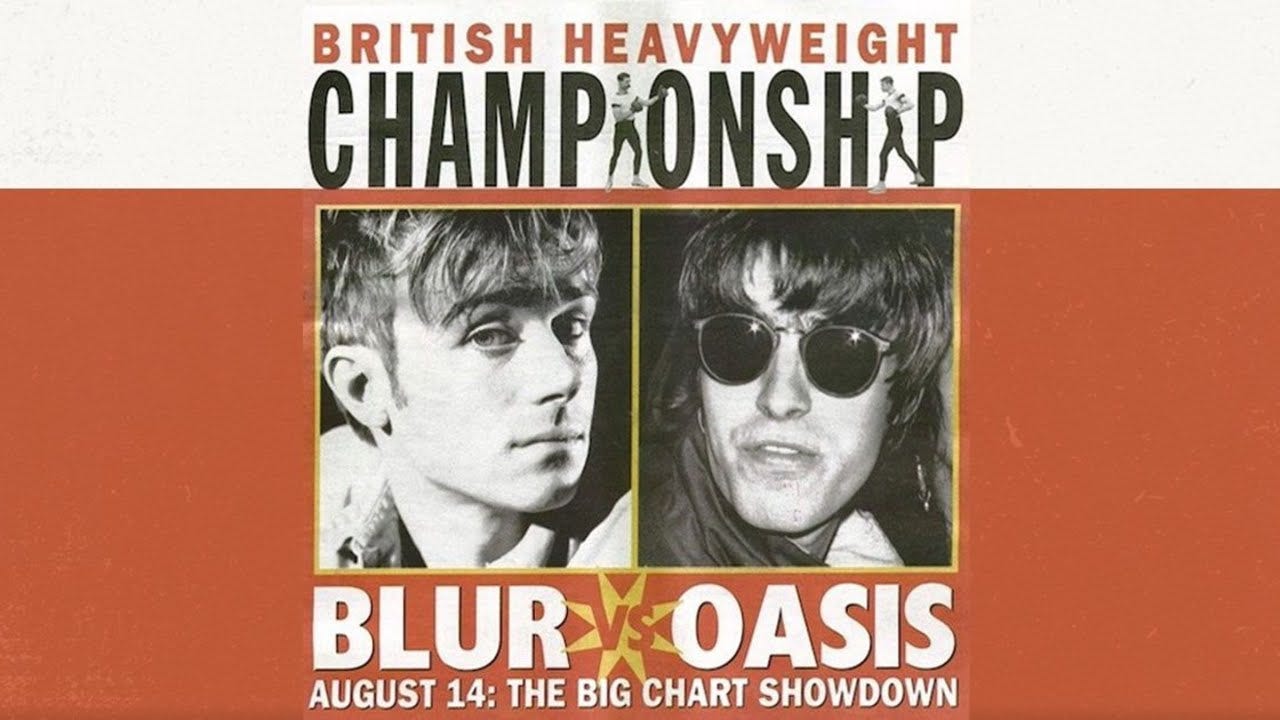
The 90s was more fixated on news than actual party politics or geopolitics. One thing that cannot be denied is that the 90s had a series of high-profile deaths and murders that really shook the nation to its core: including, the abduction and murder of James Bulger in Liverpool, Princess Diana’s death (more on that later), Stephen Lawrence’s murder in London, Leah Betts’ death from a drug overdose in Essex and the murder of Kelly Anne Bates being among the most notable though it is important to add that there were more. It’s important to state that the 90s was not perfect, not by any stretch.
The mid-90s gave us Britpop, Euro 96, the Spice Girls, Tibetan Freedom Concerts and much more. During the mid-90s, I distinctly recall a counterculture start to develop as well with the likes of Bjork, Portishead and the Prodigy coming through into the mainstream, emphasising the point that the 90s really did seem to have something for everyone. The mid-90s was also the last time I recall the country truly being united. Euro 96 gripped the nation like no other sporting event in living memory ever had or likely ever will. The spirit, optimism and togetherness were unlike any before or after. People sang, bunting was everywhere, pubs were fun places to be and the energy and positivity was palpable. England were so close to winning but ultimately it wasn’t to be, defeat in the cruellest of circumstances against Germany ended our dreams. The point here being that we had dreams, there was hope and we were indeed a proud nation. What made this period so special is that everyone was joining and that’s how it should be. Now, however, we have a complete cultural malaise and separation, with political themes now a part of everything from television commercials and sport to films and dramas.
That optimism was captured by New Labour and Tony Blair. ‘Cool Britannia’ was in the air and Blair understood the mood of the nation and capitalised on it. New Labour were, by definition, young: Tony Blair had played rock music at university, he had a much-publicised kick about with football legend Kevin Keegan and also drinks with Noel Gallagher in July 1997. Blair would go onto be the country’s youngest prime minister since 1812. Britain was in the midst of social, political and cultural change and we all embraced it. Brit pop was an expression of this change and many feel that it was a reaction to Thatcherism, as a generation that had felt abandoned and marginalised during the 80s had finally found a voice and a movement.
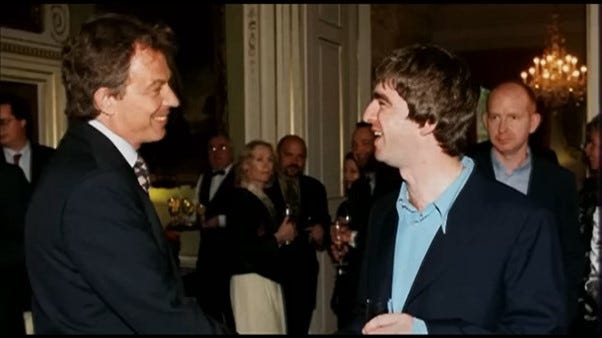
Britpop became the soundtrack to a generation, that might sound cliched but it is true. It paid homage to the past while being distinctly British as well. Previous musical styles and movements didn’t have anything like the broad-based appeal of Britpop. Sadly, there will likely never be another quintessentially British movement like it again: the culture that produced Britpop has been consigned to the past just like the movement itself, additionally music has changed so much since then, as has Britain itself. There were many stand out bands, songs and albums but Oasis’ What’s the Story (Morning Glory)? reigned supreme; from start to finish it was a masterpiece that will likely not be surpassed, it is timeless in a way that few other albums are. * The decade even gave us a Beatles reunion (of sorts): despite initially mixed reactions, Free As a Bird and Real Love sounded different and yet strangely familiar at the same time. Millennial Woes made the point, an important one too, that a lot of good and influential music came out of the decade that was not Britpop.
British cinema also held its own, films like Trainspotting and Shallow Grave spoke to the youth in a way that American films simply never could. Other films like The Full Monty and Lock, Stock and Two Smoking Barrels also met with critical acclaim. The author would love to provide an in-depth analysis of these films but that will have to wait, the main thing to understand is that the confidence Britain had as a nation came through in these films and in general through the art of the time. That being said, how could I not say at least something about Trainspotting. Set in the late 1980s, the effect of Danny Boyle’s 1996 adaptation of Irving Welch’s novel on popular culture and on the country more broadly was almost immediate. Despite being wrapped up in the Cool Britania motif of the mid-90s, its depiction of both poverty and drug addiction left many stunned. ** This plays into wider themes about how prevalent drugs were in the 90s, particularly cocaine and heroin.
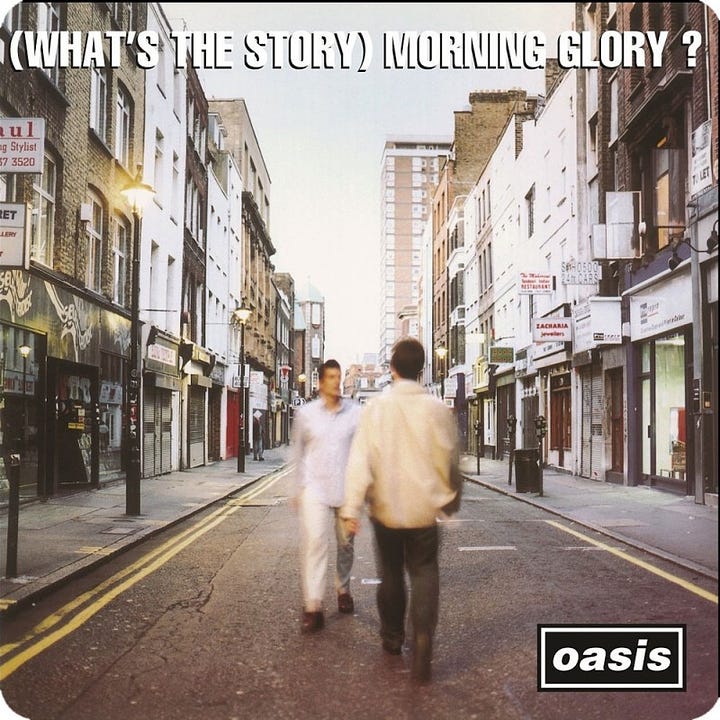
Then came August 31st 1997. I recall it vividly. That day, I had one thing and one thing only on my mind: Liverpool were at home to Newcastle United and my Sunday would not be interrupted, how wrong I was. Moments after waking up, news from Paris was coming through on the radio, Princess Diana was involved in a fatal car accident and though the details were scant the outcome of the accident was anything but. The football was cancelled, everything was cancelled and the nation drowned in collective sorrow and despair leaving an emotional scar on the country that even to this day has not fully healed. Diana’s death was like Britain’s 9/11 in that for many it is still genuinely hard to come to terms with and also because there is something about the event that feels a little off, something still not quite right.
Technology was a part of our lives but didn’t overwhelm us like it does today. Though the personal computer was steadily growing in prominence as the decade wore on, there were still no QR codes and algorithms, no hashtags and no social media, the world was a better because it was simpler. The Eurotunnel was a big deal, connecting us to the continent both figuratively and literally, on first hearing it seemed like something out of a Jules Verve novel. Sky Television launched in 1989 and – for better or for worse - became a permanent fixture of British life for many households in the 90s. Sky television is highly significant because it would be a conduit for American culture, entertainment and influence (basically, soft power) that would grow over time: from WWF wrestling to Jerry Springer, MTV to American movies that were now being shown daily, considering where our culture is now it is hard to overstate the importance of this. I seem to recall from the mid-90s onwards that more and more news from the United States started to make its way onto British screens and into our newspapers: from the OJ Simpson trial and the Columbine Massacre to the moral dimensions of gangster rap and alternative rock music and much more.
Individual articles could probably be written about the cinema, television and music from the decade. One things of note is how the plight of the middle-class suburbanite, whose day primarily consisted of what might today be called first-world problems, found an expression in television series like Friends and Seinfeld. Friends, in particular, struck a chord with many: it is hard to put into words why it became so popular but it does say a lot about the zeitgeist in the 90s. With little to protest and complain about, life was good, most of the bad stuff in the world had been put away or was too far away from us to care and Friends was the result.
The decade ended on a fairly sad and serious note. With financial crises gripping Asia, Russia and Argentina, the war in Kosovo and the American embassy bombings in East Africa, meanwhile Naomi Klein’s No Logo and the anti-globalisation protests in Seattle and elsewhere revealed that perhaps this capitalism thing might not be all it was cracked up to be. In some ways, the end of the decade would set the tone for the next century. I think the cultural malaise and general uncertainty of the late-90s found a potent expression in films like American Psycho, The Matrix, Being John Malkovich and Dark City, movies that captured the shifting zeitgeist perfectly: these movies were self-referential almost to the point of absurdity, in which it was genuinely hard to know what to expect and even harder to know what to believe but half of the time that was the point all along. On a similar note, the decade also gave us the magic eye craze, a patterned sequence that was said to reveal a hidden picture if you looked hard enough but one in which you were never quite sure what you were looking at, in many ways it serves as a perfect facsimile of the decade itself.
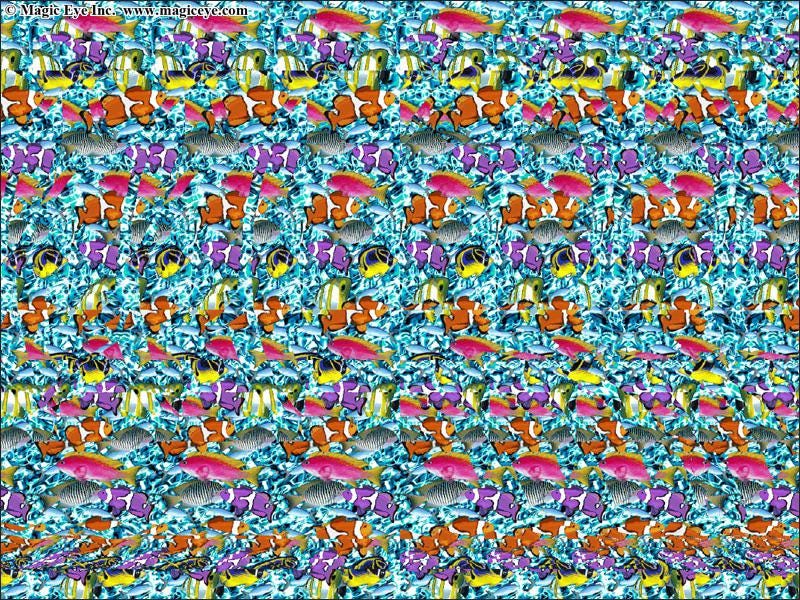
The end of the 90s was also the end of the century and it brought with it an uncertainty regarding both who we were and where we were (in history) that was hard to put into words though Fight Club (released in 1999) said it best, “We are the middle children of history” Tyler Durden says “Our great war is a spiritual war. Our great depression is our lives”.
This was an incredibly challenging article. I found it very hard to fit everything in and for the sake of practicality I have regrettably had to omit quite a lot. There was so much I didn’t say and even more I couldn’t say because words were simply not enough. I am somewhat more conflicted now than I was at the start of this article as well but for now this is my take on a decade that was a lot more complex than l had initially realised. In closing, if l could say one thing about the 90s it’s that, while the decade wasn’t perfect, we were largely content and happy, yet we didn't even know it at the time but we do now.
Notes
* In the UK, only one album has sold more copies since (What’s the Story) Morning Glory?
** I have to confess to fretting over Trainspotting somewhat. Just to clarify, the book is actually set in the late-80s, the film came out in the 90s, yes, but it is about Scotland in the 80s.